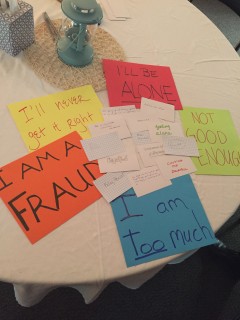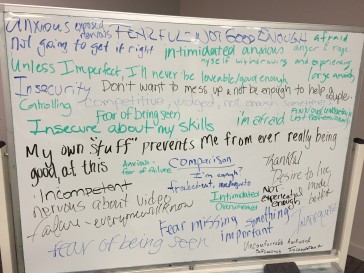Accepting Your Anxiety
Accepting that you get anxious can feel like you are surrendering to something awful. I encourage you to congratulate yourself because it’s not easy to recognize anxiety! In fact our anxiety often manifests itself in many different ways. For example many people believe that they are having a heart attack and end up in the local ER. Others focus on the external things, “If I just had a clean house I wouldn’t feel this way” or “If I just had a new job I’d be better.” Yet despite making many changes, we end up with the same symptoms reappearing over time. Finally we figure out that it’s our body that is undergoing a stress response.
So, seeing your anxiety and accepting that it’s something happening inside of you, that causes you to go into a fight and flight response, is a big first step!

Understanding Your Anxiety
Great! Now what? And it’s not all bad news. Identifying the problem is half the solution! Because you can manage what you know and can make sense of. The other good news is that you are not alone. 16 million Americans suffer from anxiety. This is actually good news, because it lets you know just how common anxiety is, and also how researched it is. There is a lot that can be done.

So now that you know it’s there, let’s start figuring out what’s going on. And to do that, you need to observe, be willing to learn, and to track well. Start a journal and write down everything that you notice about your stress response.
How do you know it’s anxiety? What in your body and mind tell you that? Is it something you keep thinking about? Or is it the pain you feel in your chest? Write down every symptom that you can. For a list of common symptoms, stay tuned; I will be covering this later this month.
Now start tracking these symptoms. Notice when they arise, and the intensity of the symptom. After collecting evidence for a couple days, what patterns have you noticed? Is your anxiety worse in the morning or afternoon? Does it present on a Monday morning after the weekend on your way back to work? Is it worse after you’ve eaten a certain food, or after you’ve been thinking about your deceased loved one? There is always a pattern, and there is always a reason. Start looking for this!
Managing Your Anxiety
Once you recognize you are anxious, your job is practice coping skills that will stop your fight-flight response and initiate a calming response. There are many different ways to do this. These include physiological ways, through deep breathing. Another way is to do exercise or progressive muscle relaxation, systematically tightening and relaxing your muscles. Make sure you are hydrated and stay away from caffeine, which aggravates anxiety. On a thought level, you are going to start to notice anxious thinking, and actively change the way you think. This will change the way you feel. Finally you are going to understand why your system has sent you anxiety, and understand what it is that your body is needing. Once you understand the root cause, and can take care of yourself in a different way, the anxiety won’t be necessary anymore.


